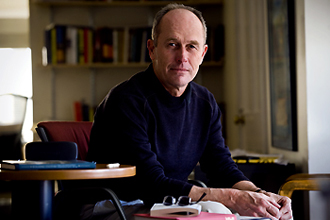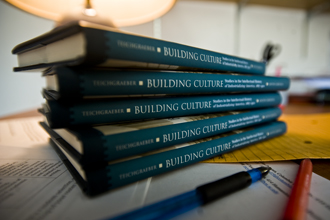Historical Look at American Culture
A gala in Gibson Hall on New Year's Eve drew hordes of high-society folks and tons of newspaper coverage. The event took place, though, not last week, but in 1903 when Tulane hosted the Twin Conventions of the American Historical Association and American Economic Association.

History professor Rick Teichgraeber's new book of essays discusses America's emerging academic culture during the late 19th and early 20th centuries. (Photos by Paula Burch-Celentano)
Richard F. Teichgraeber III, professor of history, describes a fascination by the public with the goings-on in higher education in his new book Building Culture: Studies in the Intellectual History of Industrializing America 1867â“1910 (University of South Carolina Press, 2010).
“Everything that was going on in the university was of interest,” says Teichgraeber.
The Twin Conventions, hosted by Tulane, was the first national gathering of professional academics in the South. The American Political Science Association also was founded at a meeting in Tilton Memorial Library (now Tilton Hall) during the three-day event. Leading academics from all around the country arrived by chartered trains.
Teichgraeber uses flesh-and-blood characters to explore a wave of interest in culture and building cultural institutions during a time when the university became a rival with the church and government as a conveyor of culture.

Teichgraeber wrote Building Culture over a 10-year period.
Americans had a notion of culture that was more inclusive and egalitarian than Europeans had, says Teichgraeber. The American ideal of culture revolved around self-construction or self-
development, rather than artistic and literary masterpieces.
Libraries, museums, women's clubs, the popular press and adult education were important parts of the self-improvement culture.
If there is a thread from a hundred years ago about what it means to be an American, Teichgraeber says it is that, “American society is a collection of individuals who are given choices about what they can make themselves to be.
“And we don't prejudge what those choices will be but we insist that the choices are important and crucial to defining individual identity.”
